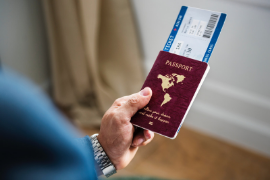Somewhere, in the back of our minds, we all know there are certain documents we shouldn’t just chuck in the bin. And we’ve all heard at least one horror story about identity theft. Yet, time and time again, the same mistakes are being made, causing people to become vulnerable and targeted.

So, we wanted to tackle this head on and let you know what you should be shredding. And rather than focus on the obvious (like bank statements), we thought it made more sense to look at some of those overlooked documents. So, check out the three we’ve chosen – you might just be surprised…
1. Boarding Passes
With the summer holidays a not-so-distant memory, many of us made the most of them by heading abroad. And, as such, the UK airports were very busy with people hopping on and off planes. Which means, unless you downloaded your boarding pass onto your phone, you likely received a paper version. But what did you do with it once you landed? Throw it away, we’re guessing. Well, that boarding pass contains some pretty useful information about you, including your name, travel plans and frequent flier number. With that number, a fraudster can log into your account, view and edit your upcoming trips, and time a burglary to coincide with your holiday. So, for peace of mind, make sure you shred your boarding passes as soon as possible after use.
2. CVs
With it being the new school year, September is often seen as a good time for job-hunting. But, to do so, it’s important to get the old CV in tip-top shape. And, in that process, you might print a few test copies out, take some copies to interviews, and discard the ones you don’t use or give to potential employers. But, think about it, your CV has all sorts of details on it about you – your name, number, address, email address, employment and education history – all on one handy piece of paper. Pretty convenient for an identity thief, eh? So, next time you’re printing out your CV, just make sure you shred the copies you’re not using.
3. Receipts
Despite an increase in online shopping and email receipts, somehow we humans have a knack of collecting till receipts – at the bottom of our bags, or stashed in our wallets. And, once we realise that collection is becoming rather large, we tend to just throw them away in bulk. Walk along a high street pavement and you’re also likely to see them scattered on the floor, or at the top of an overflowing bin. So, receipts are everywhere and easily accessible to anyone who cares to pick them up. Which they might if they’re a fraudster. For these till receipts contain part of your credit or debit card number and, often, your signature. So, if you’re not keeping a receipt, make sure you shred it – or, even better, go paperless and help the environment in the process!
The above are just three examples of documents we should all be shredding on a personal level. At work, too, we have a legal responsibility to dispose of information securely. Here’s just a few examples to consider:
- USB sticks, hard-drives (even those portable ones!) and other media products
- Double check your junk folder and that e-mails are sent to the correct recipient addresses
- Even branded uniforms, name badges and counterfeit products can hold sensitive information and require secure disposal – find out more here
If you would like any help to do so, or more information on what to shred, just get in touch with us on 01242 588600 or at sales@printwaste.co.uk, and we’ll be happy to help!
